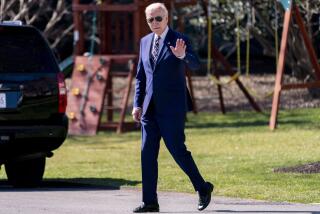Budget Realities May Slow ‘Kinder Nation’ Goal
- Share via
WASHINGTON — In the expedient shorthand of his political campaign, George Bush drummed home his vision of the country he wanted to lead.
“I want a kinder and gentler nation,” he vowed from one shore to another, in small towns and growing cities, to farmers and steelworkers and to the biggest audience he faced: a television-watching America on the night of his nomination.
But the words and programs that Bush advisers believe helped define a new identity and blunted attacks by his Democratic foes face a future that is neither kind nor gentle.
As Bush and his aides draft their specific fiscal agenda, Democrats and some prominent Republicans voice substantial doubt as to whether Bush’s campaign promises to increase funding for education, the environment and children and to ease the problems of the poor will be prominently represented in the 1990 budget.
New Initiatives Doubted
Sen. Jim Sasser (D-Tenn.), chairman of the Senate Budget Committee, insists that, because Bush has pledged not to increase taxes, there is simply no room for new initiatives.
“The first thing jettisoned will be the campaign promises,” Sasser bluntly predicted.
“Right now, the question of child care and expanding Head Start and school lunch programs and meeting the environmental commitments . . . are going to be the least of his worries. He needs to find out how he’s going to escape the budget ax without proposing new revenues.”
Even Rep. Dick Cheney of Wyoming, a fellow Republican, advises Bush against floating any new programs before making headway against the deficit.
“The reductions ought to come first,” Cheney said. “I think for the Administration to argue that we need new spending in certain areas takes them off the moral high ground.”
But Bush advisers are equally insistent that, because of Bush’s personal instincts--and the political damage if he turns his back on his promises--the new President will attempt to force through at least some of his “kinder and gentler” approaches.
“There are problems other than the deficit, challenges other than the deficit,” one high-ranking Bush adviser said.
The adviser was seconding others who believe that Bush will initiate new programs--mostly introductory in nature and skimpy in outlay--while he simultaneously works to curb the deficit.
What Bush is planning remains a tightly held secret, pending his address to Congress on Feb. 9. Senior officials attending the daily planning sessions for Bush’s first months have refused to comment on specifics, other than to say that Bush plans to adopt “new priorities,” different from those in Ronald Reagan’s final budget proposal.
But, in the two months since his election, the pressures against Bush’s initiatives have grown. The President-elect must juggle not only the existing deficit but also the newly pressing need for more than $80 billion over the next 20 years to clean up and modernize federal nuclear facilities and a similar sum to bail out the troubled savings and loan industry.
Bush has sent conflicting signals about his intentions. At almost every opportunity, he has heralded his commitment to increased money for education, child care and the environment; but, at the same time, he has suggested that solving the deficit will take first priority.
For example, Bush equivocated recently when asked if he would press for money to back up his vow to cleanse the environment of acid rain and other pollutants.
“There are not all the monies available that I would like to see for all the good things that need to be done,” he said.
The total cost of Bush’s proposals is difficult to ascertain because many of them were vague and thematic, advanced without cost estimates so that the candidate could not be backed into a corner about his spending plans.
During his campaign, Bush repeatedly made proposals in areas usually identified with Democrats to adroitly broaden his appeal and undercut the campaign of Massachusetts Gov. Michael S. Dukakis, his Democratic opponent.
Urged Child Care Outlays
He proposed a $2.2-billion series of tax credits and spending for child care. He vowed $600 million in new spending for education. He promised--without saying how much it would cost--to protect the environment. He said that he would expand the Head Start program to cover all needy 4-year-olds and would increase Medicaid for children and pregnant women. He advocated hundreds of millions of dollars in additional spending for the homeless.
All told, Bush spelled out more than $4 billion in new spending--and described programs that, although he did not say so, would cost billions more.
Bush himself has not detailed his priorities since the election, but senior aides suggest almost unanimously that he will push several proposals.
At the least, those aides agree, Bush will request more money for elementary and secondary schools and for Head Start, the preschool program that is universally praised as beneficial to underprivileged children.
However, Head Start is a costly venture, and it is illustrative of the lofty goals and vague fiscal details of Bush’s proposals.
Bush routinely included the Head Start spending--without a cost estimate--in his calls for $600 million in education spending or as an addendum to his $2.2-billion child care proposal. But the government now spends $1.2 billion for Head Start while serving only 20% of the needy 4-year-olds--meaning that almost $5 billion would be needed to round out the program as Bush has said he would like.
Once he is President, Bush is also likely to press for some sort of child care program, although advisers suggest that a compromise may have to be reached between Bush’s original plan--heavily weighted toward tax credits--and a Democratic plan that would give money to the states to use in licensed child care centers.
Commission Suggested
At least one adviser has suggested that Bush form a commission to study options in child care--a notion that would buy Bush time to win support for his plan and delay funding.
Bush advisers acknowledge that any recommended federal spending increases probably will be modest, setting a tone for change without seriously disrupting the budget. At the same time, Bush will press programs like his proposal for an ethics commission and for a domestic Peace Corps, which would spend $100 million in seed money--buttressed by matching donations--to send young Americans into poor areas to help the disadvantaged. Both are seen as projecting a kinder and gentler image without much cost.
“Bush understands that leadership in Washington consists of 1,000 little micromoves every day, the sum total of which adds up to leadership,” a high-ranking aide said.
Advisers say that Bush will also reinforce the theme with displays of personal good will--particularly to potential political opponents--such as those that have marked his transition.
“The whole kinder, gentler nation thing--I don’t think that implies only spending money,” long-time Bush aide Peter Teeley said. “You can look at it in terms of spending but, also, I believe, it’s the way you live your life.”
The Bushes’ social approach, less grand than that of the more aloof Reagans who preceded them, is expected to pay dividends by underscoring the “kinder and gentler” style he envisioned during the campaign.
“At the end of eight years, I don’t think it will be a big deal to say, ‘I’ve been to the White House.’ Half the country will be able to say that,” said one Bush adviser, intending only a hint of exaggeration.
Bush aides see a successful start on some new initiatives as crucial, both to set a tone for his first term and to give him a running start on a second term.
Republican Rep. Jim Leach of Iowa, an early Bush supporter, said that Bush’s policy proposals “preempted the Democratic rallying cries and undercut the message that they wanted to propose.”
“George Bush could not have won on negatives alone,” said Leach, who believes that the new President will quickly propose--and get--modest spending increases for education and a compromise child care plan. “A (reelection campaign) in 1992 will have to be credited to . . . the positives.”
“The most important thing is credibility,” seconded a senior aide, who suggested that Bush would be severely hurt in 1992 if he turned his back on his earlier vows.
“If you increase Head Start, you may have to make that up elsewhere,” the aide said. “But I don’t buy the notion that there’s no place left to cut.”
Indeed, the central stumbling block for Bush’s proposals are of his own making: his insistence that he will not raise taxes and his reliance on a “flexible freeze” to cure the deficit.
Under that freeze, overall budget growth will be limited to the increase in inflation, and any new spending will have to be offset by equal cuts in other programs. Neither in the campaign nor in his transition has Bush detailed any cuts that would make room for new initiatives.
Democratic members of Congress, who have little faith in the flexible freeze and doubt Bush’s commitment to more liberal programs, insist that Bush himself come up with funding for any new programs.
More to Read
Get the L.A. Times Politics newsletter
Deeply reported insights into legislation, politics and policy from Sacramento, Washington and beyond. In your inbox three times per week.
You may occasionally receive promotional content from the Los Angeles Times.











